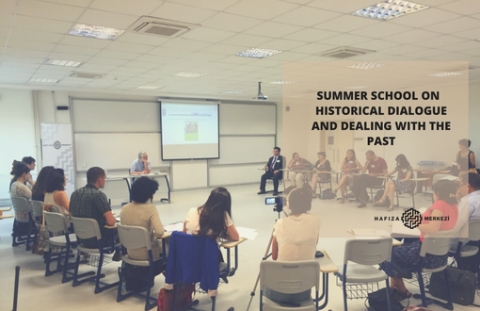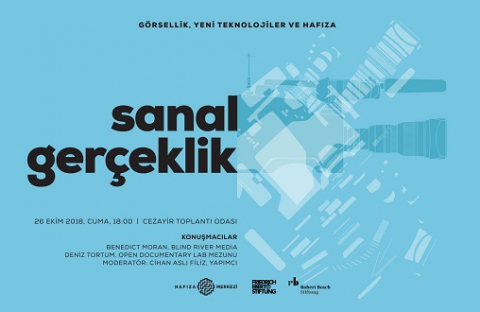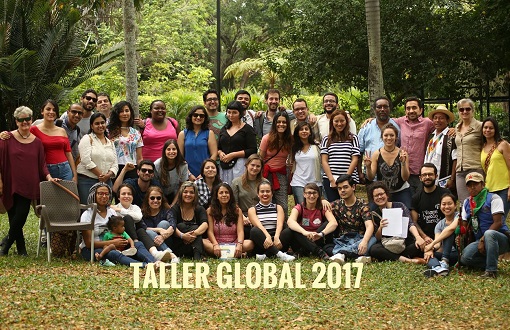
Activists from South gathered in Colombia
Group photograph of the participants of the workshop, Colombia, September 2017, Photo: Dejusticia
Kerem Çiftçioğlu
Truth Justice Memory Center (Hafıza Merkezi), Communications and Campaign Program
Organized annually by the Colombian think tank Dejusticia in Bogotá, this one-week workshop was attended for the first time by Enis Köstepen from Hafıza Merkezi in 2015. Upon his arrival to Istanbul, as Hafiza Merkezi, we started to follow closely the peace process in Colombia, especially thanks to the articles published by Dejusticia. As is well known, peace negotiations concerning the 50-year long conflict that has killed 950,000 and displaced 7 million people gained momentum at the time. Thanks to this encounter, we invited researcher Nelson Camilo Sánchez from Dejusticia to the Summer School on Historical Dialogue and Dealing with the Past held in 2016 and listened to his presentations on the peace process in Colombia. His first presentation was open to the public; the second was open to summer school participants. Throughout this learning process, I have been very impressed by Colombia, where highly creative means of negotiation are used for the longest conflict in the world, and also by Dejusticia, our source of information. For this reason, I became quite excited when it was decided that I would be the one to represent our center in the workshop to be held in 2017.
More than a think tank
Dejusticia defines itself as an action-research center focusing on legal and social studies. They prefer to call themselves as a think/do tank rather than a think tank. This bold, curious and creative organization has a wide range of interests: i) the rule of law ii) the empowerment of disadvantaged groups iii) transforming economic, social and environmental policies that result in inequality in line with human rights principles iv) the empowerment of the actors from the Global South in discussions around global human rights.

Colombia, (Source: Wikipedia)
Moreover, a number of factors impress me about the workshop and Dejusticia. They motivate me to write this piece.
The first thing that grabs my attention about Dejusticia is the fact that they have a global mission, more than I would expect from a Colombian non-governmental organization. They use the terms Global North and Global South to understand international relations and focus on global problems that are faced by the human rights movement. As an outcome of this intellectual endeavor, the theme chosen for this year’s workshop was the issue of shrinking civic spaces, which goes hand in hand with the global populist wave, and the threats it poses.
Aside from having a global mission, Dejusticia is an organization that is strongly inspired by social movements in Colombia and Latin America. The organization conducts its research and advocacy efforts on issues such as economic justice, environmental justice, drug policies and transitional justice by establishing organic relations with social movements that work on these issues. Every year, they organize the workshop in a city that is related to the discussion theme of the year and help participants come together with the members of related social movements. This year’s program was held in the capital Bogotá, as well as the city of Cali, located in the Pacific region of Colombia, where a large population of people of African descent lives. In this framework, we had the chance to meet with leading community leaders of the Pacific region.
More than a workshop
Let’s talk about the details of the workshop. Organized for the fifth time this year, the workshop or in its longer version the Global Action-Research Workshop for Young Human Rights Advocates [1], is a week-long program that aims to develop creative writing and research skills of human rights activists of the Global South. The goal of the workshop is a reflection of the global vision of Dejusticia, which aims to develop relations between human rights activists from the South without the mediation of the North. [2] Thus, it is also aimed to increase the competence of young activists from the South to convey their stories in international discussions on human rights. 19 rights defenders from Yemen, Ecuador, Chile, India, Brazil, Belarus, South Africa, Turkey, Egypt, Bosnia Herzegovina, Mexico, Venezuela, Kenya, Russia and Argentina participated in this year’s workshop.
“Human rights movement consists of people who have a story to tell. The reports have to be more than technical texts to express what is humane. For this reason, in this workshop, we aim to increase communication, narrative writing and research skills of the participants. The workshop also aims to underline different opinions in the human rights universe where voices from the United States of America and Europe are usually heard louder.”
Excerpt from the introductory text of the workshop.
The program focused on three areas: 1) research 2) narrative writing/communication skills and 3) thematic discussions.
In sessions on research, senior researchers of Dejusticia gave seminars on action-research approach. [3]. Dejusticia defines its action-research approach with the term amphibious and argues for the researcher’s active presence both in movements and academia without compromising scientific accuracy in line with the dual role this term refers to. In these sessions, the aim is to introduce participants to discussions on ways to reconcile their roles as activists and researchers. In action-oriented research approach, an important risk factor is the questioning of the objectivity and reliability of the researcher who has organic relations with social movements. To counter this criticism, which should be seriously considered, the workshop underlined the importance of expressing the subjective position of the researcher.
The program’s second area of focus was the creative writing workshops which encouraged us to position ourselves as narrators. The most important rule of the writing exercises was to write in the first person, instead of the third person. That way, we were invited to express ourselves without hiding behind the technical language of the or politics and write appealing stories by getting into literature.

Gabriel Garcia Marquez on the left, Nelson Redy Padilla on the right. Photo: From Nelson’s presentation
Inspiring journalist Nelson Redy Padilla, who is the Sunday editor of one of the leading newspapers of Colombia, El Espectator, conducted the creative writing workshops. Nelson, a literature enthusiast who had worked with Gabriel Garcia Marquez in the past and has received numerous journalism awards in Colombia and the region, told us about the role of literature in his journalism experience and how literature appeals to the senses. These four sessions led by Nelson encouraged us to release the storyteller within us.
An extraordinary method: The Council
A skillful storyteller is no doubt someone who can connect with their emotions. This skill requiresand effort. During the workshop, council meetings were a concrete expression of such an effort. The Council is a speaking and listening practice which comes from a Native American tradition. In the Council, people are gathered in a circle and express their emotions about a specific subject. Members only speak when it’s their turn. A member may choose to pass their turn or remain silent throughout the whole session. Its secret lies in four simple intentions which are directions that a member is expected to move in: One should speak from the heart, listen from the heart, speak spontaneously and leanly. That is to say, we are invited to let go of our usual behaviors, such as planning what we are going to say next when someone else is speaking and trying to look smart, and express our emotions fully and listen to one another.
You are there to be your genuine self. You’re opening up to other people, sharing your personal experiences and the things you have been through. And they are listening to you. When you have the opportunity to express yourself without being judged, without being criticized, you get to hear other people’s stories too. I think there is a commonality in a lot of our stories. When you hear it, you’re able to say, ‘He has been to something I’ve been through, and I can relate to him,’ it helps you grow even more in terms of opening up.
Edward, Inmate Council Program Participant at Ironwood State Prison [4]
When I came back to Istanbul and checked some materials on the Council, I realized that this was a method widely used in a lot of social projects in the USA. I highly recommend you the video below in which inmates at the Ironwood State Prison talk about their experiences in the Inmates Council Program.
We held three councils during the workshop where we talked about intimate issues about ourselves such as the best traits of our moms or our biggest fears in life. We all had emotional moments in these councils where we shared our most vulnerable sides. The result was shocking as well as transforming for all of us. This circle, where we were able to cry to our stories as well as to others’, became our ‘safe zone’ where we expressed ourselves authentically.
As civil spaces are shrinking around the world…
In addition to presenting sessions that aim to develop skills (research and narration), the program also focused on the theme of shrinking of civic spaces in line with the rise of right-wing populism all around the world. [5] The sessions on the subject concentrated on threats to human rights movement posed by this global phenomenon and actions that we can take against these threats.
We started the discussion with the presentation of Dejustia’s director César Rodriguez on some of the main global dynamics that should be addressed by the human rights movement. César talked about different conditions that affect today’s human rights movement as opposed to 40 years ago. Accordingly, today’s world is a multipolar world where our relationships are transformed by information and communication technologies, virtual networks and where global power relations are balanced in favor of the South. As opposed to the proliferation of human rights norms in the ‘90s, today there is a global trend of regression in acquired rights.
For example, the lobbying approach which was adopted by leading Argentinian human rights organization Center for Legal and Social Studies (CELS) and named by César as the boomerang approach, is not functional anymore in the face of this situation. During 80’s, CELS concentrated most of its international efforts in Washington and put pressure on the USA to force Argentinian government to end its violations. In today’s world, I guess we are all familiar with the populist responses we get in response to such Western oriented advocacy, accusing human rights defenders of being agents of
According to César, the answer to this challenge is not the approach that was traditionally adopted by global NGOs such as the Amnesty International or Human Rights Watch, which employ the vertical integration model that prioritizes the universal standards represented by their headquarters over unique needs of each country. [6] Instead, NGOs from the South should use their expertise of the specific context of their country and take the chance of becoming partners in the long run, which may take more time and money. Therefore, they should turn their regional networks into multiple boomerangs. It is of utmost importance to benefit from models of virtual connectivity facilitated by new technologies in this process. By following examples of digital campaign platforms such as Avaaz.org, traditional organizations should find a way to reach out tech-savvy activists from younger generations.
In the remaining sessions of the workshop, which focused on thematic discussions, we talked about waves of populism that are on the rise in various parts of the world. We have looked for answers to some of the following questions: What is the difference between frequent attacks against human rights and today’s developments? Which governments are more susceptible to put pressure on civic spaces? Which tools and methods do they mostly use? Problems that result in the closing of civic spaces such as limitations against local and international funding sources of the civil society, barriers against associations, arbitrary detentions of and pressures that escalate to physical violence against rights defenders and smear campaigns were among the issues we discussed and looked for solutions.
| Regimes | Tools |
|---|---|
| Question: Is it only authoritarian regimes that put pressure on the civil society? | Question: Is physical violence the most common method used to suppress activists/right defenders? |
| Research has shown that pressures against the civil society are more frequent in the regimes below: • Anocracy • Countries dependent on foreign aid • Poor and extremely poor countries • Countries that recently had an election experience | Research has shown that these are the ways in which civic space is put under pressure: • Lawfare • Smear campaigns • Restrictions on funding • Physical obstruction or violence • Economic pressure/attack • Sackings in media • Taking control of institutions • Loss of academic freedoms • Internet manipulation • Co-optation |
The workshop is over, but the process continues
In the last Council session, César, with all his honesty said that his biggest fear was that the things we worked and discussed during workshop would not have any lasting impact for the future. I guess, it is because of this healthy fear that Dejusticia was thoroughly prepared to have concrete outcomes from the workshop. Firstly, they have asked participants to write research pieces between 10,000 and 12,000 words in which they should use the skills they developed in the workshop. This commitment was already a criteria for the application. That way, what happened in the workshop will not stay in the workshop, and the newly acquired skills will have a practice field. Dejusticia will then publish these articles in a thematic publication and circulate the stories from the South to the international human rights community.
On the other hand, we tried to answer a more practical question on the last day of the workshop. What kind of collaborative work can be done that addresses the needs of civil society that we have identified in the thematic discussions and bring together individuals and organizations which have no previous experience of working together? The quick answer to this hard question was suggested in the form of a mobile application. It turns out that Dejusticia has already been developing the idea of utilizing mobile application for the service of civil society, which would function like alumni applications used by universities to manage their relations with their alumni. This way, it will allow the workshop participants to share information and talk about some practical issues.
To give content to this idea, during the workshop we have designed six mobile applications with functions in six areas (fundraising, psychosocial support, relations with the media, data analysis, databases and graphic design), in a way that meet the identified needs of human rights defenders from the South. Each of these design ideas were noted by Dejusticia to be worked on. In conclusion, by applying some of the ideas we proposed, Dejusticia committed to produce a mobile application to be used by workshop participants.
Two rights defenders from the Global South
I saved for the end what I should have said at the beginning. Of course, participants are what makes a workshop special. And this workshop was particularly inspiring in this sense. I will end my commentary by briefly talking about two of the activists whose work is also quite related to our work in Hafıza Merkezi.
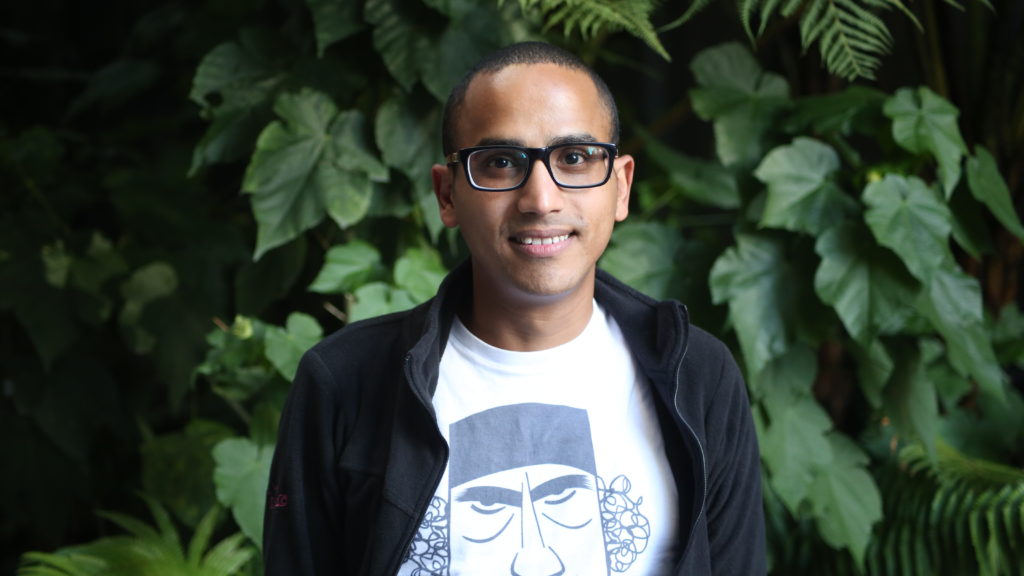
Photo: Dejusticia, Giselle Alejandra Zarate Tobon
Yemeni researcher and activist Osamah Alfakih documents and reports grave violations of human rights in the Mwatana Organization for Human Rights which he co-founded. His work has a high psychological burden since the civil war, during which Yemeni cities have been bombed and which has claimed the lives of 2,795 civilians as of January 2016. Osamah told us that a lot of his friends had lost their lives, the rest had left the country, and he has become alone in this process and is fighting severe depression. Nevertheless, his work has an important role in informing the international community about what happens in Yemen. His qualified reporting is considered as a reference in the field by leading human rights organizations such as the Amnesty International and Human Rights Watch. For this reason, Osamah does not consider leaving the country, at least for now. There, we also learned that he had to put so much effort into arriving to the workshop. He was accepted to the workshop last year, but the coalition led by Saudi Arabia had closed the Sana’a airport for civilian flights. For this year’s workshop, he had to spend four days during which he traveled by land from Sana’a to Salalah (Oman) and took connected flights between Salalah, Doha, Istanbul, and Bogotá.
“I left Sana’a Monday morning, and it took me Friday morning to reach Bogotá. I made a 23-hour bus trip from Sana’a to Seiyun in East Yemen. A couple of hours later, I took a bus to go from Seiyun to the Omani border. That took 10 to 11 hours. I had to wait at the border from 10:00 in the morning to 19:30 in the evening. Border control usually takes about half an hour, but I was unlucky; it took longer to have my name at the border. It was two hours from the border to the city of Salalah. There, I had my dinner and slept for 4 hours. I woke up and went to the airport. Then I took a connected flight from Salalah to Doha, and then to Istanbul and to Bogotá.
Osamah Alfakih
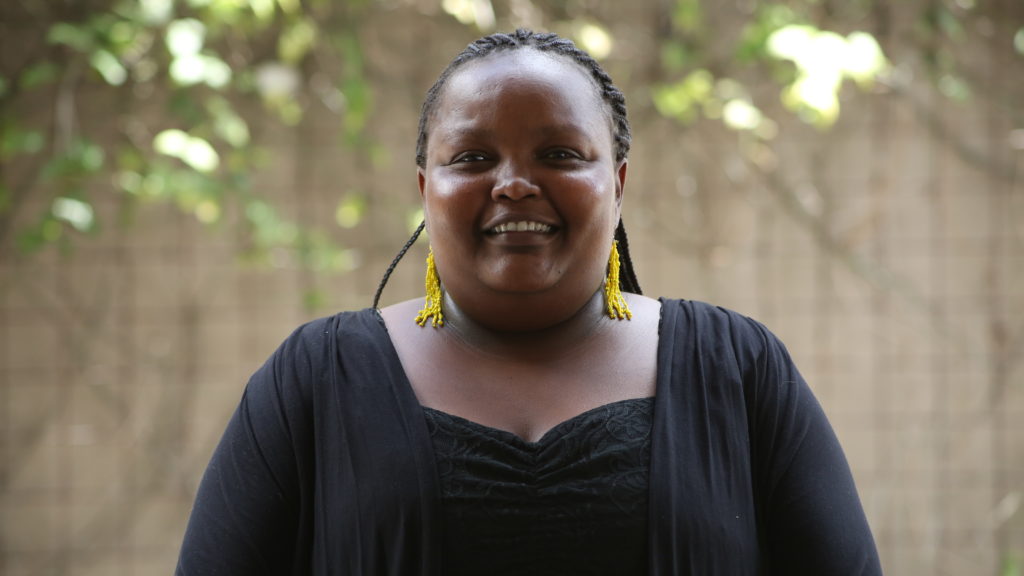
Photo: Dejusticia, Giselle Alejandra Zarate Tobon
Lydia Muthiani is a lawyer who has done some incredible work on women’s rights and transitional justice in Kenya. She is now responsible for sexual-reproductive rights and transitional justice programs in East Africa (Kenya, Uganda, Tanzania, and Rwanda) at an international NGO called Women’s Link Worldwide as a senior attorney. Before that, Lydia had worked at the International Criminal Court (ICC) on incidents of violence that followed the Kenyan elections in 2007. Unfortunately, all charges, which included crimes against humanity such as murder, deportation and rape, pressed against Kenya’s current president Uhurutu Kenyatta as an indirect co-perpetrator were dropped in 2015 due to a lack of evidence. Kenyatta is Kenya’s president since 2013. Lydia had to deal with all the risks that came along with working in a case that involved high-ranking officials. She had to take a six-month leave as a result of phone threats she received due to her work.
In addition to Osamah and Lydia, I should also name Natalia from Mexico, Juan and Sylvia from Ecuador, Manoel and João from Brazil, Ezequiel and Jennifer from Venezuela, Slavenska from Argentina, Sebastián from Chile, Rajanya and Vibi from India, Lejla from Bosnia Herzegovina, Inna from Belarus, Ektaa from South Africa, Katerina from Russia and Mostafa from Egypt. All these people have thought me a lot and become windows into their countries and inner worlds. We’ll meet again with some of them and won’t be able to so with some others, but I will always remember this program with a smile on my face thanks to the special connection we had.
[1] The Global Action-Research Workshop for Young Human Rights Advocates
[2] Dejusticia also has different international workshops towards this vision https://www.dejusticia.org/en/how-we-work/internationalization/
[3] Dejusticia, “Amphibious Research: Action Research in a Multimedia World” (Bogotá, 2015), https://www.dejusticia.org/en/publication/amphibious-research-action-research-in-a-multimedia-world/
[4] Center for Council, https://www.youtube.com/watch?time_continue=2&v=phZJs_ojeWI
[5] Themes of the previous years were inequality (2016), transitional justice (2015), environmental justice (2014) and mining industry (2013).
[6] César also mentioned that these two organizations started to distance themselves from this organizational model and organize in a way that takes into consideration the local context of each country.

